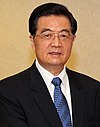11th National People's Congress
|
|
|||||||||||||||||||||||||||||||
|---|---|---|---|---|---|---|---|---|---|---|---|---|---|---|---|---|---|---|---|---|---|---|---|---|---|---|---|---|---|---|---|
|
|||||||||||||||||||||||||||||||
|
All 2,987 seats to the National People's Congress |
|||||||||||||||||||||||||||||||
|
|||||||||||||||||||||||||||||||
|
|||||||||||||||||||||||||||||||
| 11th National People's Congress | |||||||
| Traditional Chinese | 第十一屆全國人民代表大會 | ||||||
|---|---|---|---|---|---|---|---|
| Simplified Chinese | 第十一届全国人民代表大会 | ||||||
|
|||||||
| Transcriptions | |
|---|---|
| Standard Mandarin | |
| Hanyu Pinyin | Dìshíyī Jiè Quánguó Rénmín Dàibiǎo Dàhuì |
The 11th National People's Congress met for a 5-year term, from 2008 to 2013. It held five annual two week sessions during in this period. There were 2,987 deputies elected to the 11th Congress in 2008, with 2972 in office at the end of the term (2012).
The first session of the 11th Congress sat from March 5 to March 18, 2008. It re-elected Hu Jintao as President and Wen Jiabao as Premier. Xi Jinping was elected Vice-President. The State Council, China's cabinet, went through major restructuring.
The second session of the 11th Congress sat from March 5 to March 13, 2009. This congress tackled issues such as the worsening global financial crisis, attempted to introduce a new social welfare system, as well as checks and balances on public officials.
The third session of the 11th Congress sat from March 5 to March 14, 2010.
The fourth session of the 11th Congress sat from March 5 to March 14, 2011.
The fifth and final session of the 11th Congress sat from March 5 to March 14, 2012.
...
Wikipedia

